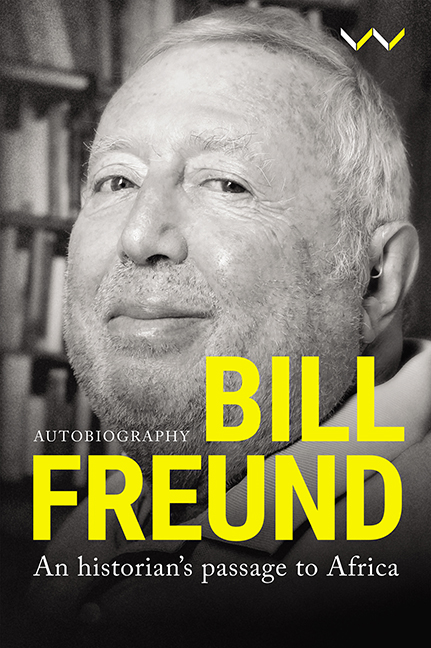Book contents
- Frontmatter
- Contents
- Foreword: Bill Freund and the Making of His Autobiography
- Family Tree
- A Brief Introduction
- 1 The Austrian Past
- 2 The Aftermath of War: A Perilous Modernity
- 3 The Dark Years
- 4 A New Life in America
- 5 Adolescence: First Bridge to a Wider World
- 6 As a Student: Chicago and Yale
- 7 As a Student: Africa and England
- 8 The Tough Years Begin
- 9 An Intellectual and an African: Nigeria
- 10 An Intellectual and an African: Dar es Salaam and Harvard
- 11 South Africa, My Home
- Notes
- Select Bibliography of Bill Freund’s Publications
- List of Illustrations
- Author’s Acknowledgements
- Supplementary Acknowledgements
- Index
11 - South Africa, My Home
Published online by Cambridge University Press: 15 June 2021
- Frontmatter
- Contents
- Foreword: Bill Freund and the Making of His Autobiography
- Family Tree
- A Brief Introduction
- 1 The Austrian Past
- 2 The Aftermath of War: A Perilous Modernity
- 3 The Dark Years
- 4 A New Life in America
- 5 Adolescence: First Bridge to a Wider World
- 6 As a Student: Chicago and Yale
- 7 As a Student: Africa and England
- 8 The Tough Years Begin
- 9 An Intellectual and an African: Nigeria
- 10 An Intellectual and an African: Dar es Salaam and Harvard
- 11 South Africa, My Home
- Notes
- Select Bibliography of Bill Freund’s Publications
- List of Illustrations
- Author’s Acknowledgements
- Supplementary Acknowledgements
- Index
Summary
In the end I stayed well under a year at the African Studies Institute (ASI) in Johannesburg. After several months, the geography lecturer Alan Mabin brought me together with two of his friends from Durban, geographer Jeff McCarthy and planner Mike Sutcliffe, both holders of doctorates from Ohio State University. Another Durban option had emerged and they succeeded in talking me into applying. And this time, the job, for a newly created professorship of economic history, was offered to me. I hesitated out of gratitude to Charles van Onselen, who was understandably annoyed at my leaving, but the idea of a permanent job, as South Africans refer to this kind of situation, and an end to those long years of uncertainty – and, after all, I now had turned forty – was too good to refuse. What I did see in Durban was the warm sea, the luxuriant vegetation and the mild winter climate. Johannesburg winter nights are cold and, after my wait in Boston, my body felt that it was experiencing a whole year of winter weather, so Durban was even more seductive. I also liked Jeff, Mike, and particularly Dan North-Coombes and his new partner, Jo Beall. Dan was a lecturer in economic history, a remarkable, erudite and dedicated Mauritian from a family that settled in South Africa via Rhodesia, a route that followed the sugar cane industry trail. Dan had a somewhat different take on race from what a South African would but, a rather late convert, he had become both an enemy of racism and a very well-read Marxist thinker; he was then organising his PhD research after having already produced an MA in economic history at the University of Cape Town (UCT). It all seemed too good to pass up. As a result I gave up my little flat on Sharp Street in Bellevue, Johannesburg, and began what would be my life in the city of Durban.
I should, however, comment on my days in Johannesburg where I met many people, some of whom have remained my friends over decades. Charles had a poor relationship with Eddie Webster, the leading light in Sociology, for reasons I can't really discern even now. Eddie has played a remarkable part in connecting his department to the renewed labour movement; indeed, its links continue to this day.
- Type
- Chapter
- Information
- Bill FreundAn Historian's Passage to Africa, pp. 161 - 192Publisher: Wits University PressPrint publication year: 2021

